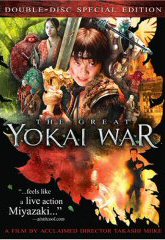
By now, nothing that Takashi Miike does should be surprising. The fact that his films continue to challenge and subvert expectation alone proves his originality. Quite simply, Miike has the ability to evoke new insights into traditional concepts, courting controversy and impressive depths of emotion. While not everything Miike creates is worthwhile, several of his films lacking story continuity, aesthetic logic, or visual integrity, his raw ingenuity cannot be discounted. Ranging from gritty surreal explosions of madness (Imprint) and grim eroticism (Audition) to Asian gangster fiascos and wacky superheroes, his devotion to internal chaos is his only constant theme, itself mirrored by the physical extension of his grandiose style. The Great Yokai War is a children's fantasy more in the vein of Harry Potter and Jim Henson adventures than the horror or grim wonder for which he is known. Viewing classic archetypes through the lens of his distorted vision, he explores ghostly armies, creatures from legend, and the coming apocalypse in a cosmic context of surprisingly traditional Good vs. Evil. The result? A thematically uneven if visually captivating moral allegory about the nature of friendship, hate and love.
In a plot culled from Yokai Daisenso (1968), merging cross cultural legends from folklore and myth with characters relevant to modernity, The Great Yokai War strives to lend pertinence to ancient ideas, but errs in diluting the narrative with awkward humor and a convoluted structure. Several Fay legends and motifs are burrowed from Eastern culture in a story that focuses on young Tadashi, a sensitive, well mannered young boy struggling to fit in with country living. Adapting to rural village life and his senile grandfather/somewhat neglectful mother, he attends a local village festival wherein he is appointed (by chance or fate), the 'Kirin Rider,' a legendary incarnation of a cosmic hero who must battle a grand evil. A 'guardian of peace and justice', his fate is no longer his own. Tradition demands that he climb the Great Goblin Mountain, retrieve a mythical sword, and face the ancient power of corruption. Thinking this is but a child's legend, he is lured to the woods by benevolent Yokai, ancient spirits of nature and spiritual ideals. Together they discover a plot of the evil Lord Kato to utilize people's hatred to summon the malignant power of 'Yomotsumono,' a force extracted from the thirst for revenge. Tadashi must face his own fear and hatred -- and a score of monsters. Armed with his courage, some odd friends, and the sword of the Kirin Rider, he becomes the last best hope of Tokyo, defending it against Lord Kato's machineries of destruction.
Never less than entertaining, director Takashi Miike has long been known for his fetishistic devotion to subversive images and themes, coating high-action plots and subversively rich themes with scathing gore, shockingly frank sexual intensity, and a childlike sense of wonder that makes these exploitative elements disturbingly natural. This combination of the nihilistic and joyous isn't present here, as Miike's usual peon of contradictions is largely disregarded for childish whimsy that isn't always successful but manage to amuse even when foolish. On one hand a cinematic terrorist, challenging both his own culture and the rigid morality of the West, Miike also defies the conventional structure of film, opting to direct his pessimistic puzzles according to their emotional energy -- operating on a surrealist-like dream logic of expressionism rather than enslaving himself to logic. This is a fantasy that is occasionally unsure if it wishes to appeal to children or explore more sophisticated imagery/themes. Often Miike opts for the later, steering away from direct horror. Still, he adapts the tone of a traditional Faerie Tale, particularly that genre's suggestion of grim nightmare in the distance of adulthood. Miike attacks the mind with as much ferocity as his intellectual/emotional stances question the simplistic morality of the status quo. A ballet of dark beauty, Miike's latest cinematic experiment is more traditional in scope and structure than what fans may be used to considering his deserved reputation as wild man. For here he adapts the structure and sensibilities of a fable -- a moralistic tale of old, celebrating classic tropes and such universal themes as responsibility, sacrifice, heroism, and the question of evil/power. Unfortunately Yokai lacks something of the grim beauty and tragic atmosphere -- the folklore subversion -- of Yokai Daisenso, and is therefore less dramatic. Everyday pressures and relations are emphasized alongside and provide an anchoring effect for the supernatural wonders, lending the later greater authenticity and emotional depth. A provocative juxtaposition between the mundane and magical is exploited. This duality is further expressed by alternating levels of the malignant and innocent, all of which creates suspense for the young and young at heart.
The visual quality for this fun if not particularly frightening feast of inspired lunacy, cgi effects, and overly cute puppets is vivid. Presented in 1.85:1 anamorphic widescreen, the colors are bright and the skin tones realistic. No grain, pixels, or other visual distortions are evident. Audio is offered in English Dolby Digital 2.0 and 5.1, as well as Japanese 2.0 and 5.1. The audio tracks are without exception clear and precise, evenly distributing dialogue and sound effects.
Extras for The Great Yokai War are basic here, pleasing if not extensive. The Yokai Character Profiles are informative if sparse, followed by a basic Stills Gallery and an enthusiastic Theatrical Trailer. Trailers for other Tokyo Shock titles conclude this package of a visually pleasing if at times nonsensical fantasy. A moral allegory from Miike . . . Who would have thought?
Review by William P. Simmons
| Released by Tokyo Shock |
| Region 1 - NTSC |
| Not Rated |
| Extras : |
| see main review |